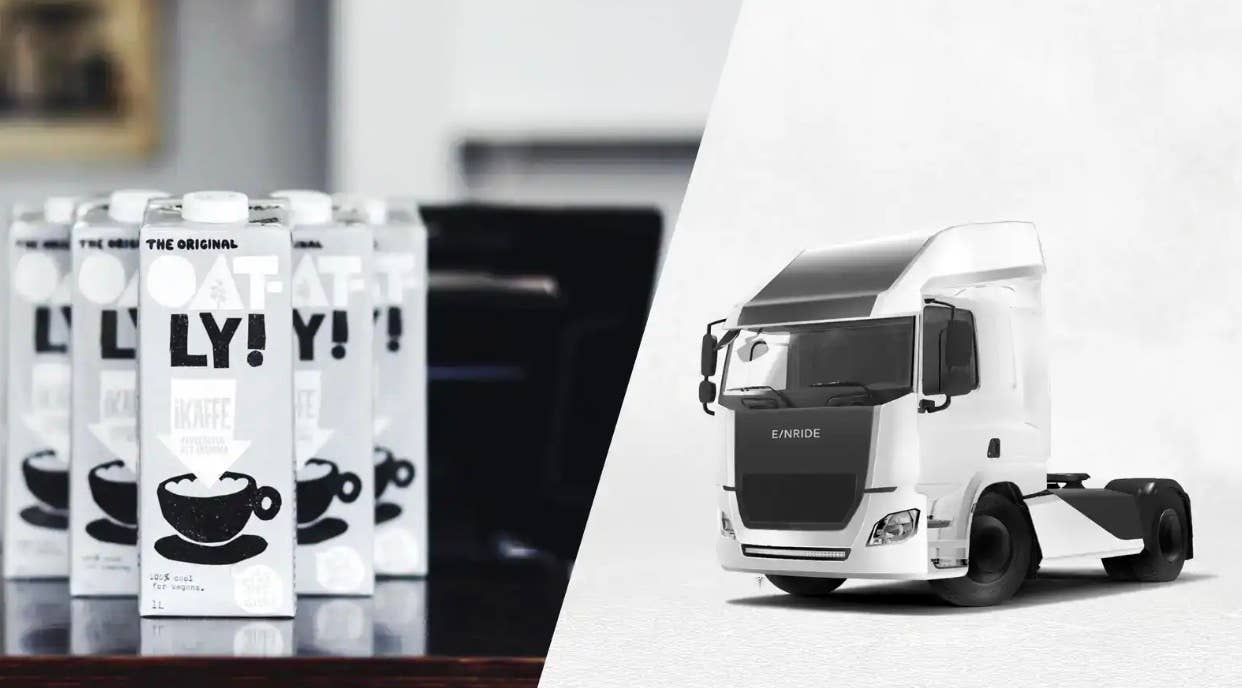
Oatly to Introduce Electric Trucks, Saving 87% of CO2 Emissions
Oatly has already managed to make plant-based products that taste exactly like the real thing but are healthier for us and better for the planet. Now Oatly has announced it is taking its sustainability goals a step further by teaming up with a fellow Swedish tech company Einride, to developed electric delivery trucks.
Oat milk is enjoying unparalleled popularity and Oatly is leading the way. The company's sales have doubled in the past two years, while dairy has plummeted 25 percent in five years. Oat milk is winning in part because of the fact that customers care about the environmental impact of their choices, and almonds require copious amounts of water to grow, something that came to light during the California drought.
Oat milk sales surged from $4.4 million is 2017 to $29 million in 2019, according to Global Market Insights, Inc. and by 2026 revenue is expected to hit $490 million. Even during this coronavirus crisis, oat milk surged 476.7% in March, because while consumers were going to the store less often, they were stocking up on their favorite staples and oat milk is something that fans simple won't live without.
Oatly Has Stayed True to Its Message and Mission to Be Planet Friendly
If you've ever wondered why Oatly doesn't source its milks or ice creams, from other plant-based proteins, it's because oats are one of the most sustainable foods. Oats require one-fifth of the water that almonds do to grow. Consider this: It takes 290 gallons of water to produce one pound of oats, whereas it takes 1,500 gallons of water to produce one pound of almonds.
Out Go the Cargo Trucks, in Come the Clean Fuel Vehicles
So it makes sense that Oatly is seeking lower-emissions transportation to get the product to market. Cargo vehicles are to blame for a large part of emissions from food transportation because of diesel fuel they burn over longer distances. The U.S. Energy Information Administration has been developing new standards for diesel fuel, but it's too little too late for Oatly. "Diesel fuel produces many harmful emissions when it is burned, and diesel-fueled vehicles are major sources of harmful pollutants," according to The E.I.A., "such as ground-level ozone and particulate matter." Oatly is introducing the electric vehicles in Sweden first and then plans to bring them to North America.
The diesel-fueled trucks also drive significantly longer than the majority of small cars on the road. Longer distances mean more emissions, and Oatly is eager to change that. Little progress has been made by companies to find an alternative to cargo trucks or even cut back on the volume of trucks used. Simon Broadbent, Oatly's Supply Chain Director, told Forbes, in regards to large cargo vehicles, that they account for "nearly 7% of all CO2 emitted worldwide--and [the trucking industry] has long been slow or resistant to change."
Electric Vehicles Are the future
We believe that electrification is not only the most cost-effective but the most sustainable way forward for this industry, Broadbent told Forbes. "In the case of Oatly alone, just four electric trucks will save over 2,100 tons of CO2 emitted per year, compared to their diesel counterparts.”
Oatly has been working towards decreasing its carbon footprint gradually, according to Broadbent. “Electrical transportation is a key part of our supply chain strategy globally and on these routes, we will be reducing our carbon footprint by 87%.” Right now, the goal is to make all deliveries in Sweden via electric trucks starting in October but will move to the U.S. once the system is flawless.
More From The Beet






